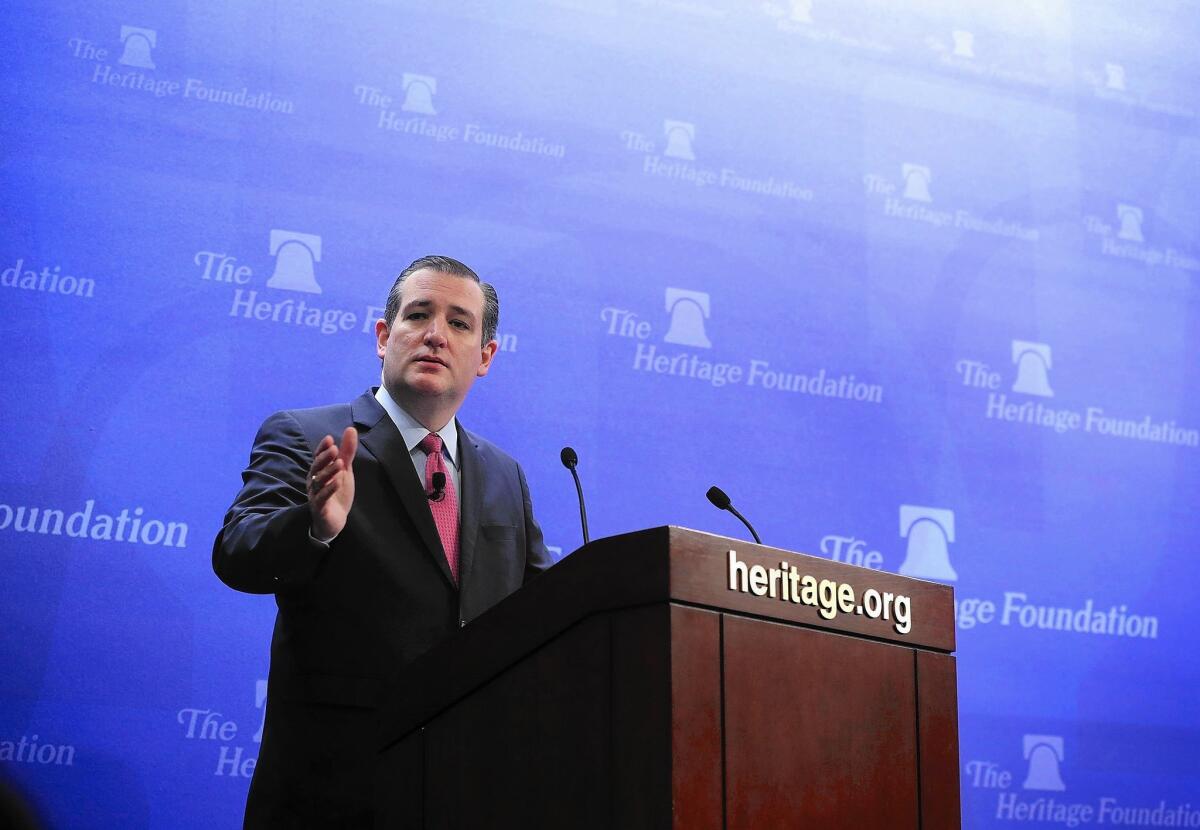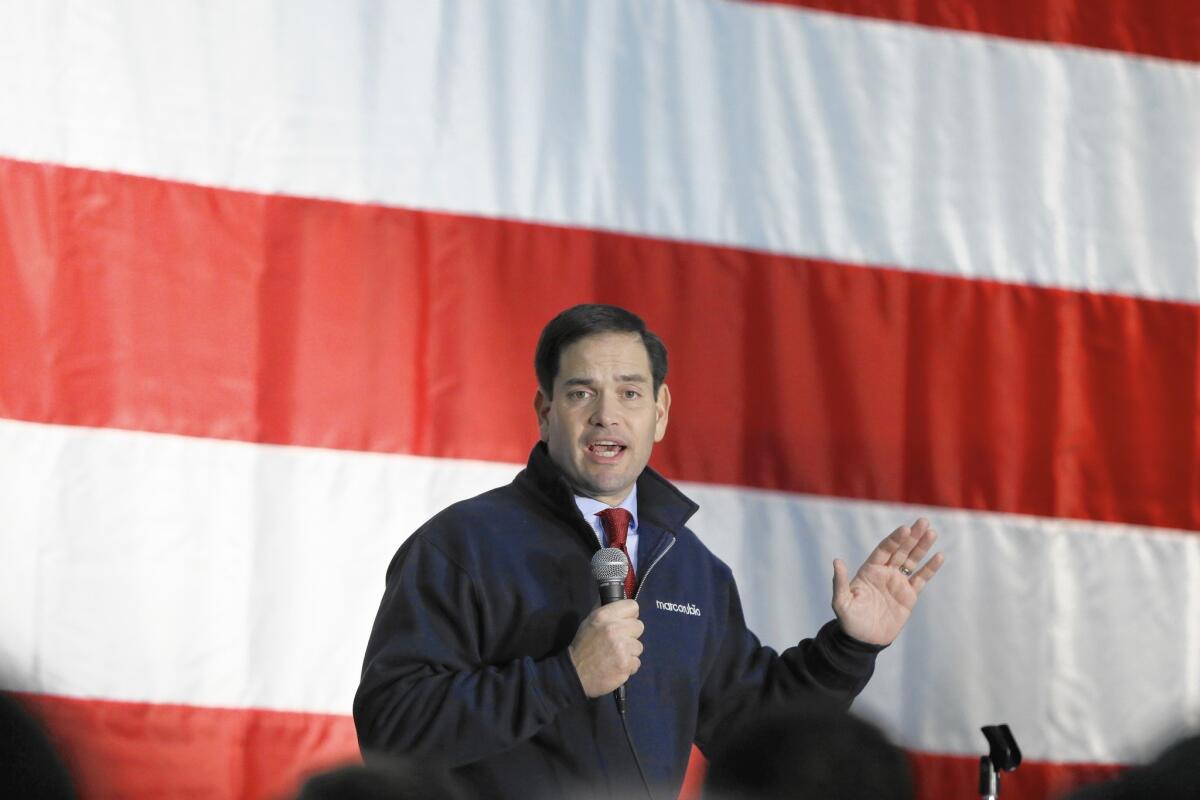Twin paths of Rubio and Cruz end at their political perspectives

Republican presidential candidate Sen. Ted Cruz.
- Share via
Reporting from WASHINGTON — Edging closer to Donald Trump at the top of the crowded Republican presidential field are two men with remarkably similar biographies: first-term senators in their mid-40s from large Sun Belt states, born five months apart to Cuban American families and propelled into the Senate by tea party rage.
Sens. Marco Rubio of Florida and Ted Cruz of Texas are presenting themselves as a hard break from the past, not only contrasting themselves to President Obama but also to the Republican Party of the Bushes.
Yet even as each vies to become the first Generation X president, they represent sharply different views of what that should mean. Rubio, 44, emphasizes his ability to convey conservative values to a culture undergoing rapid social and technological evolution, combined with a persistent call to engage the world more forcefully. Cruz is more directly focused on antagonizing establishment figures in Washington, appealing to an audience that feels betrayed by the country’s demographic and economic transformation.
TRAIL GUIDE: All the latest news on the 2016 presidential campaign >>
Their colliding visions have become a crucial subplot in a Republican nominating contest that has itself evolved as a freewheeling competition for the party’s identity. Trump is the most visible and polarizing figure in that debate but could prove to be only a part of it. Cruz has taken the lead from Trump in recent polls of would-be Iowa caucus-goers, including by 10 percentage points in a survey released this weekend.
“We’re moving on as a party. We’ve run people who come from the exact same mold recently,” said Brandon Newton, a Republican district chairman in South Carolina. “And them two,” he said of Cruz and Rubio, “both come from different backgrounds.”

Cruz, who will turn 45 next week, has positioned himself as the true outsider, even though he holds elected office, joking that he needs a food taster when he dines with fellow Republican senators and promising to alter traditional electoral norms by uniting the most conservative factions of his party.
“A lot of conservatives feel that the leaders that they have been counting on in Washington have failed to fight for them,” said Ramesh Ponnuru, a senior editor at the National Review and a fellow at the American Enterprise Institute, both influential on the right. “It’s not just that they’ve lost but that they haven’t really fought.”
Despite warnings from party elders that the Republican Party needs to broaden its appeal, Cruz argues that social conservatives, tea party supporters and libertarians can win a general election if they unite behind a single candidate who excites them enough to turn out and vote. Cruz and his advisors believe the middle is shrinking in a country where an increasing number of voters get their information from partisan sources.
“Every time we listen to the voice of ‘run to the middle,’ we get clobbered,” Cruz said recently on Fox News.
Rubio, promising to turn the generational page and emphasizing his story as the child of immigrants, has pushed an aggressive foreign policy and anti-terrorism message more closely in line with Republican orthodoxy. Not ceding tea party supporters and evangelicals, his backers argue that he is the only candidate who can unite both the archconservatives whom Cruz is courting with mainstream Republicans who find Cruz’s edges too hard.
As one Rubio supporter put it last week, “Cruz’s support is deeper but at a narrower bandwidth.”
Even as Trump’s outsized personality continues to overshadow other candidates, Cruz and Rubio have been sparring with each other for weeks over immigration, Syria policy and domestic surveillance.
“Cruz and Rubio are now trying to throw elbows at each other because someone has to emerge as the only remaining candidate to take on Donald Trump,” said Ari Fleischer, former press secretary for President George W. Bush.
Cruz has tried to define Rubio as a mainstream Republican, a tricky task given that Rubio won his Senate seat by defeating a sitting Republican governor by rallying tea party supporters.
Cruz has pointed to Rubio’s previous efforts at crafting a bipartisan immigration overhaul that is unpopular among Republicans who view it as an amnesty program. Cruz’s allies are hoping that effort, since disavowed by Rubio, disqualifies the Florida senator among core conservative voters.
“Historically, there have been two major lanes in the Republican primary. There’s been a moderate lane and a conservative lane,” Cruz said on CNN last month. “In past cycles, there’s been a consensus moderate choice early on. … Look, I think Marco is certainly formidable in that lane.”
Rubio and his advisors believe that national security will remain the preeminent issue in the election and that Cruz has compromised traditional Republican strengths to win over libertarians. Rubio has criticized Cruz for voting in favor of a bill to limit the bulk collection of phone data as part of government surveillance efforts.
“Each time he’s had to choose between strong national defense and some of the isolationist tendencies in American politics, he seems to side with the isolationist,” Rubio said of Cruz on NBC’s “Meet the Press” on Sunday. “And this is an important issue to have a debate over. It’s not personal.”
Cruz, while vowing to wage an aggressive anti-Islamic State campaign, has argued that some U.S. efforts to use military force in the Middle East have created openings for terrorists, and he warned last week against any effort to topple Syrian President Bashar Assad.
“Toppling a government and allowing radical Islamic terrorists to take over a nation is not benefiting our national security. Putting ISIS or Al Qaeda or the Muslim Brotherhood in charge of yet another state in the Middle East is not benefiting our national security,” Cruz said.
Their different paths are reflected in who is flocking to their campaigns: Cruz picked up an endorsement Thursday from Bob Vander Plaats, an influential conservative Christian in Iowa, whose organization, the Family Leader, is at the forefront of efforts to stop abortion and gay marriage. Rubio, meanwhile, won backing from Kenneth Griffin, a billionaire 47-year-old hedge fund manager from Chicago who gives broadly to education and the arts.
Twitter: @noahbierman
Times staff writer Lisa Mascaro contributed to this report.
MORE ON CAMPAIGN 2016
Sen. Ted Cruz extends lead among GOP contenders in Iowa, new poll finds
What Marco Rubio’s foray into the 2013 immigration overhaul push revealed
Donald Trump’s support comes from every Republican ideology but not every class
More to Read
Sign up for Essential California
The most important California stories and recommendations in your inbox every morning.
You may occasionally receive promotional content from the Los Angeles Times.











